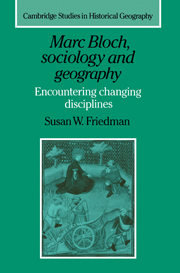Book contents
- Frontmatter
- Contents
- List of tables
- Acknowledgments
- A note on translation
- List of abbreviations
- Introduction
- 1 Marc Bloch and the “Université”
- PART I Sociology, geography, and history during Marc Bloch's years of apprenticeship
- 2 Marc Bloch's training as a normalien
- 3 History under attack
- 4 The quest for identity in Vidalian geography
- 5 From the Fondation Thiers to the doctorate: Marc Bloch's emerging perspective
- PART II Marc Bloch as a critic and practitioner of sociology and geography
- Notes
- Index of names
- Subject index
- Cambridge Studies in Historical Geography
2 - Marc Bloch's training as a normalien
Published online by Cambridge University Press: 23 November 2009
- Frontmatter
- Contents
- List of tables
- Acknowledgments
- A note on translation
- List of abbreviations
- Introduction
- 1 Marc Bloch and the “Université”
- PART I Sociology, geography, and history during Marc Bloch's years of apprenticeship
- 2 Marc Bloch's training as a normalien
- 3 History under attack
- 4 The quest for identity in Vidalian geography
- 5 From the Fondation Thiers to the doctorate: Marc Bloch's emerging perspective
- PART II Marc Bloch as a critic and practitioner of sociology and geography
- Notes
- Index of names
- Subject index
- Cambridge Studies in Historical Geography
Summary
I belonged to a school where the dates of entrance made it easier to identify changes. Early on, I found I was much closer, in many respects, to the classes which preceded me than to those which followed almost immediately. My friends and I placed ourselves at the last point of what one could call, I believe, the generation of the Dreyfus Affair.
Marc Bloch. Apologie pour l'histoireThe school to which Marc Bloch referred was, unquestionably, the Ecole Normale Supérieure. By identifying himself with the preceding classes, he associated himself with the classes which were marked by their Dreyfusard sympathies: critical of the army, often anti-clerical, and worried about anti-Semitism. Furthermore, as Alphonse Aulard noted in 1903, most of the students at the ENS were attracted to a moderate form of socialism associated with Jean Jaurès, a sympathy which Bloch shared. The normaliens of Bloch's year and their predecessors were also characterized by the nature of their academic work which was shaped in part by both the institutional structures in which they found themselves and the intellectual atmosphere of the times.
Bloch entered the ENS at the age of eighteen in 1904. That was the same year in which the school became united with the University of Paris and was given a new director, Ernest Lavisse.
- Type
- Chapter
- Information
- Marc Bloch, Sociology and GeographyEncountering Changing Disciplines, pp. 21 - 38Publisher: Cambridge University PressPrint publication year: 1996



